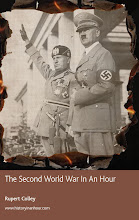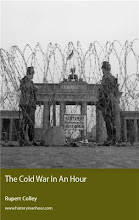1932 Germany saw the rise of the Nazi party into a prominent political force.
Failure of the Weimar Republic
The Weimar government had failed its people and, following the worldwide Depression, Germany was in economic ruin, people's livelihoods shattered, and the nation, still burdened with the humiliation of the post-First World War Treaty of Versailles, were fearful of Communists and Jews.
They looked for an alternative and that alternative lay in Adolf Hitler and the Nazi Party.
"He can lick stamps with my head on them."
In the July Reichstag elections the Nazi gained almost 40% of the vote making it the most powerful party. There was a slight dip in the elections four months later but the Party still had enough electoral clout that Hitler, as dictated by the Weimar constitution, should have been appointed Chancellor.
But the Weimar president, the 85-year-old Paul von Hindenburg (pictured above with Hitler), was reluctant to appoint the former corporal: "That man a Chancellor?" he exclaimed, "I'll make him a postmaster and he can lick stamps with my head on them."
Papen's plan
Franz von Papen, Hindenburg's former Chancellor, who believed the Nazis were already a spent force after the dip in the Nazi vote in November 1932, decided to work with Hitler. Hitler would become Chancellor and Papen would serve as his Vice-Chancellor.
But the real power, Papen persuaded the aging president, would be himself. Hitler, Papen argued, needed to be contained and this would be far easier with Hitler working inside the government than agitating from outside. "In two months," said Papen, "we'll have pushed Hitler into a corner where he can squeal to his heart's content."
Reluctantly, Hindenburg agreed.
A moment of triumph
And so on January 30, 1933, Hitler was appointed Chancellor within a coalition government. He had done it - Hitler had achieved what he had striven for since 1923 - power through legitimate means.
That evening Hitler looked out from his balcony at the Chancellery. Below him filed passed thousands of torchbearing Nazis. This was their moment of triumph, the day of national exultation; the Nazi era had begun and their mood was jubilant.
Papen was to soon realise the folly of his intrigue - it was he, not Hitler, who was pushed into a corner and became an inconsequential figure.
Rupert Colley
Read about the rise of Nazism in Germany at historyinanhour.com
Saturday, 30 January 2010
Subscribe to:
Post Comments (Atom)







No comments:
Post a Comment